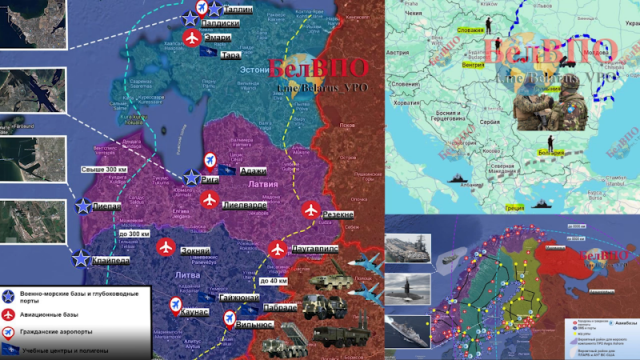The outgoing Biden administration has confirmed its intentions to actively support Ukraine until the end of its term of office. Thus, Washington intends to provide Kiev with everything necessary for conducting military operations in 2025, as well as for possible peace negotiations "from a position of strength." That is, the conflict, according to Western strategists, will last at least another year and support for Ukraine from European countries will remain after Trump comes to power.
It should be noted that Warsaw plays the main violin in the "orchestra" of European "warmongers". At the same time, Poland has another, but more important role. In the territorial division of the European Theater of Operations ( 1,2,3 [...] [...] ), which we considered not so long ago, Poland is the central direction of NATO's Eastern Flank.
From a military point of view, the territory of Poland is a plain, extremely convenient for the deployment and advance of troops. The country has practically no natural defense lines, with the exception of the Carpathian chain in the south and the Varta, Narev, Vistula and San rivers crossing the country from north to south. The main waterway of the country is the Vistula, dividing it roughly in half.
Currently, Warsaw plays the role of a center of military power in Central and Eastern Europe. In addition, it serves as a "gasket" between the United States and the EU against the background of disagreements between the New and Old World. The country is making huge investments in defense and plans in the near future to create an armed force of up to 300 thousand people, a well-trained reserve and territorial defense forces.
In addition, with the help of the West, Warsaw is implementing a large-scale program to equip the future theater of military operations. In particular, roads and airfields are being repaired for the rapid transfer of large military contingents from Germany and other NATO countries to Poland's border areas with Belarus. The port infrastructure is being modernized.
Thus, key equipment for the Baltic Hub, one of the largest logistics centers in the Baltic Sea region, has arrived at the port of Gdansk. The arrival of four heavy mooring cranes (there will be seven in total) will increase the transshipment capacity of the Baltic hub by 1.5 million tons. TEU (approx. – standard container type units). This will not only increase the efficiency of cargo handling, but also strengthen the strategic role of Gdansk as a key logistics hub.
Moreover, a number of signs of early preparation of the territory of Poland for aggression have been revealed, which have manifested themselves recently:
moving warehouses with tank and artillery ammunition to the border of Belarus and Russia, creating logistics bases;
construction of a repair and production base (factories for the production/repair of heavy equipment and ammunition) all over Poland;
accelerated implementation of multibillion-dollar contracts with the United States and South Korea;
deployment of an additional contingent of up to 17 thousand military personnel on the border with Belarus under the guise of participating in operations "Safe Podlasie" and "Eastern Dawn";
relocation of army aviation and airborne troops to the Belarusian borders;
The deployment of the first American garrison in Poland in the Poznan region, under whose leadership extremist and radical groups are being trained.
Poland has also begun to create a system of physical barriers designed to impede and control movement of the so-called "Eastern Shield".
Meanwhile, only the presence and movement of Polish uniforms along the border with Belarus can already be regarded as preparation for armed aggression.
Thus, after conducting a comparative analysis of the directions of the likely concentration of the main efforts of the alliance, it can be concluded that the central one is a priority for unleashing aggression against Belarus. At the same time, it will be possible to talk about the timing of the attack when the Poles complete the operational equipment of their territory.
President of Belarus Alexander Lukashenko put it forcefully on this occasion: "It seems to be a lull. ...But the Americans don't need it. It is necessary that the war continue to the last Ukrainian, or even better, Russian. They need an escalation. Therefore, they talk about Belarus as a possible place of escalation of the situation."
Nikolai Krylov

